A World Without Google
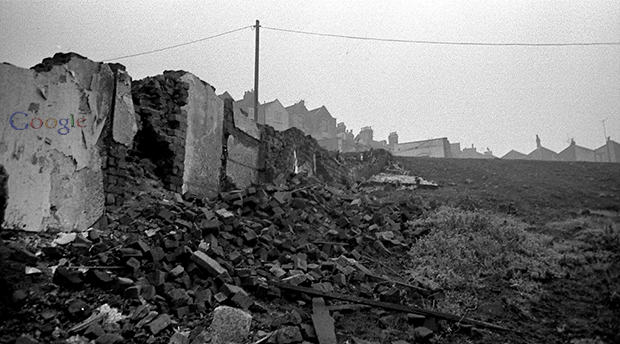
Today marks the 15th anniversary of Google, undoubtedly the most successful Internet concept ever. In just a short time, Google has become a seamless part of our lives, ranking somewhere between Jesus and bacon in importance. The brand has joined the ranks of Kleenex and Xerox (and if you’re in the South, Coke), with its name becoming synonymous with its product and somewhat generic as we “Google” this or that. Most of the world can’t use a smartphone without using a Google product. Some people can’t even travel across their own city without using Maps. It's hard to fathom a life without it. Google Reader users, however, got a small taste of life would be like without the Big G in our lives.
On July 1, 2013, Google Reader said its last goodbyes and walked off into the sunset. Though far from a popular product, it still had its fair share of fans and public outrage. A petition was created for it on Change.org, garnering over 150,000 signatures. Just one small, almost forgettable product in Google’s portfolio had such a fanatical cult following that people were willing to make a petition about it next to fighting for women’s rights and stopping Medicare cuts. And it was taken seriously.
It begs the question: what would happen if some of Google’s other products went quietly into the night? Though we imagine we’d get by somehow, I’m not so sure.
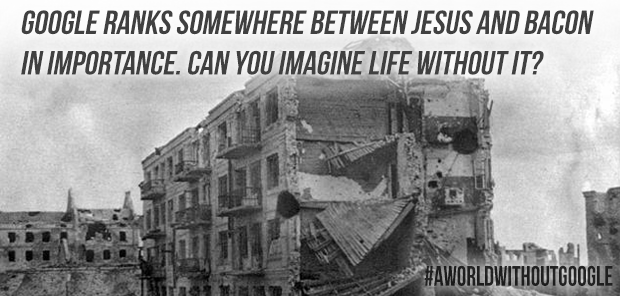
What if one night at the stroke of midnight in a grand Cinderella moment, the Googleplex and all the little Google offices just up and disappeared? No more Google Drive, Google Voice or Google Scholar. No more Google Fiber or Google Hot Air Balloons delivering high speed Internet. No more AdWords or Analytics to help businesses big and small reach their customers and develop marketing strategies. No more Googling this or that or anything. It would be like waking up to something right of the Walking Dead, as people search for answers and their livelihood in a world gone mad.
Day One
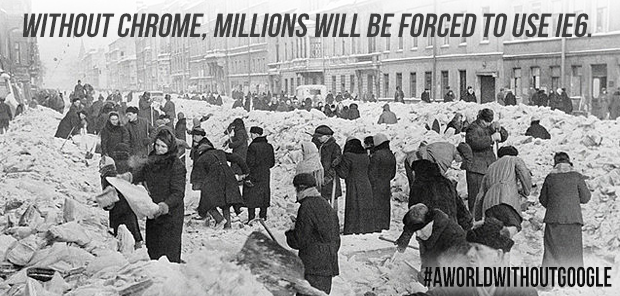
Like all great tragedies, it starts slow, quiet, somewhat quaint and almost endearing. Google goes down, inciting questions of terrorist hackers. Users are forced to put down their phones, tablets and laptops and stop their search for life’s most pressing questions, such as the secret of life and how many names did the band Jefferson Airplane actually have. People traveling under the cover of night are forced to visit truck stops and interact with actual people for directions. Busy CEOs, entrepreneurs, and ambitious digital marketers are annoyed to the heavens and forced to get a good night’s rest for once.
And in the morning, the tragedy sinks in.
Millions wake up with their cell phones dead, rendered nothing more than husks as their Android technology has dried up. Millions more go to their computer to find out what the problem is but can’t seem to find their Chrome browser icon. Their only choices are Safari or IE 6.
Even more people are confounded as they attempt to check their Gmail, both corporate and private, and get a 404 page. Not found. Not found.
The world is forced to return to their Yahoo! and Hotmail (now Outlook) accounts they haven’t used since 2004. They go to retrieve their email passwords and realize that their backup email where their password will be sent is their Gmail.
Day Three
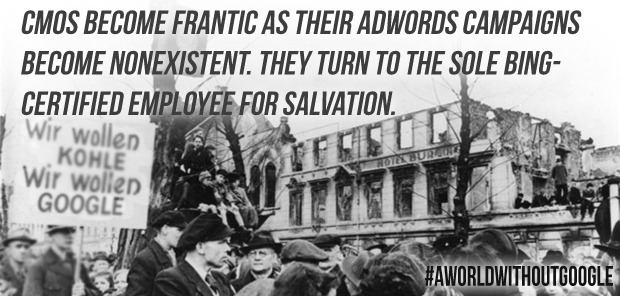
CMOs become frantic as all their AdWords campaigns have come to a screeching halt while their analytics are now non-existent. Corporations are losing millions every day in revenue, while small businesses are considering closing up shop. They start pointing fingers and looking to the lone Bing-certified employee in the office for salvation.
AT&T, Verizon, Sprint, and T-Mobile are overwhelmed with calls and visits from customers who are experiencing the 5 stages of grief. No Android phone is working, and people just can’t fathom the problem. They just want their phones to work. A customer service rep at a store in Albuquerque, NM suggests giving the customers a Windows phone. Riots quickly ensue.
Meanwhile, the production lines of Samsung, HTC, LG and other phone manufacturers come to a standstill as people struggle to figure out why the operating system won’t operate. In the blink of an eye their most profitable product is now non-existent. Profits plunge as the suicide rate skyrockets.
Day Five
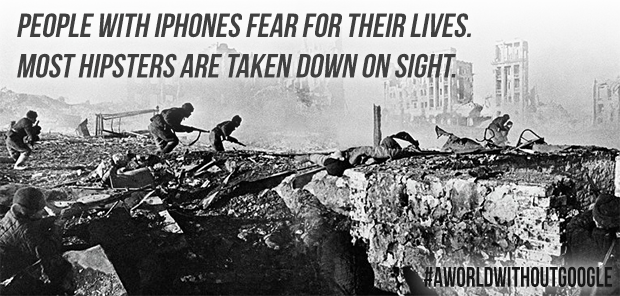
All across the world, mayhem begins to take over. Flip phones that were worthless just days ago are going for astronomical prices on eBay. People with iPhones fear they will be attacked in the streets. Most hipsters are taken down on sight.
People blame the government for taking away their beloved Google in some grand scheme to keep the populace uninformed. Conspiracy theories include everything from aliens to the Rapture.
Businesses—especially small businesses that can’t afford a large-scale analytics platform such as Coremetrics or Omniture and who make up about 75% of jobs in the US—begin to implement layoffs until they can solve their analytics and marketing issues. The unemployment rate escalates to almost 40% overnight.
Start-ups and competitors that offer similar products attempt to remedy the problem. However, it all proves to be much ado about nothing as the products are either less than user friendly, have major issues, or are just too little too late.
Large corporations, such as Comcast and AT&T, also attempt to provide solace to the situation by offering similar services and old phones. However, they are accused of trying to profit from a great tragedy, leading to riots. With so many people out of work, on edge, and with nothing but time on their hands, these riots turn into a great uprising that spreads throughout the world. Riots spike across the land like a strong breeze over a minefield.
Day 30
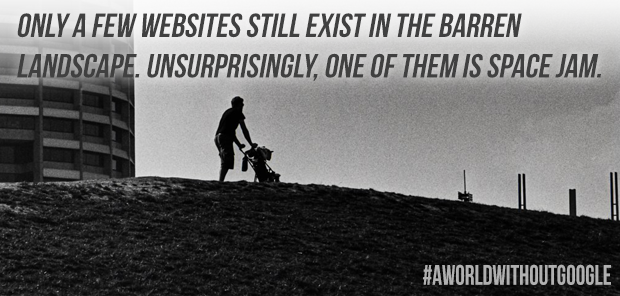
After the collapse of the economy, the world falls into a deep depression. The country is left mostly in ruins. Shantytowns litter the landscape. It’s a no man’s land where people have reverted to being hunters and gatherers or trading in skills and services. People of greater means have established walled city-states. Separate nations and republics have begun to form. They are about as stable as Central Europe. The world has turned into something straight out of Mad Max, with only despair in sight.
There are a few outposts of technology here and there, mostly in former major metropolitan areas. A few stalwart techies who understand technology maintain servers and a few websites. And yes, Space Jam is still up.
The End?
In truth, it would be hard to think of all the implications of a world without Google. The brand is entrenched in our lives in such an immersive and subversive way, there’s no way we could honestly imagine or even prepare for such a tragedy.
It’s how we find that song we fell in love with the first time we heard it. It's how we find that brand of diabetic socks our grandmother finds so comfortable and how the company that makes said socks is able to deliver them to us. It’s our way of finding that house party we were invited to without giving in to despair after not being able to find a landmark such as “The Big Chicken”. It’s how small businesses and start-ups are better able to serve their consumers, adjusting their sites and strategies to better appeal to the marketplace.
It’s how we achieve a million other things that my mind fails to remember or even comprehend that make our lives a little better and a little easier.
Sure, there are many competitors and upstarts chomping at the bit to take some of Google’s market share. Some of them—I’m sure—are even better. However, the stress and opportunity costs of such a venture make it difficult to even consider.
With that said, we wish a big, wonderful, happy birthday to Google. Thank you for all your apps, your ad platforms, your analytics, your technologies and for just being awesome. We don't know what we'd do with you.
Comments
Add A CommentSorry, but this is BS. If Google would dissapear like in a huge atomic explosion, Android would still be running, and their products are distributed worldwide, so the whole world would have to perish.
If Google would retroactively vanish, no one would miss them, we'd all have iPhones or the phones of a competing company, that just didn't make it (Blueberry? Nokias own Smart OS?)
So the only scenario I can see that doesn't involve magic, aliens or an angry god are solar flares (or terrorist detonating thousands of nuclear bombs at high altitude to create a worldwide EMP, also quite a fairy tale) that render all of earths electronics useless. And then we'd have much bigger problems, then just Google not being available for searches.
Thank you so much to this exciting game platform. I am enjoying playing this https://myeuchre.com and inviting other people.
sometime i imagine same too, it is certain that Google has the world at finger tips and definitely captured most of the population most people work online as affiliate or promoters of its products independently.